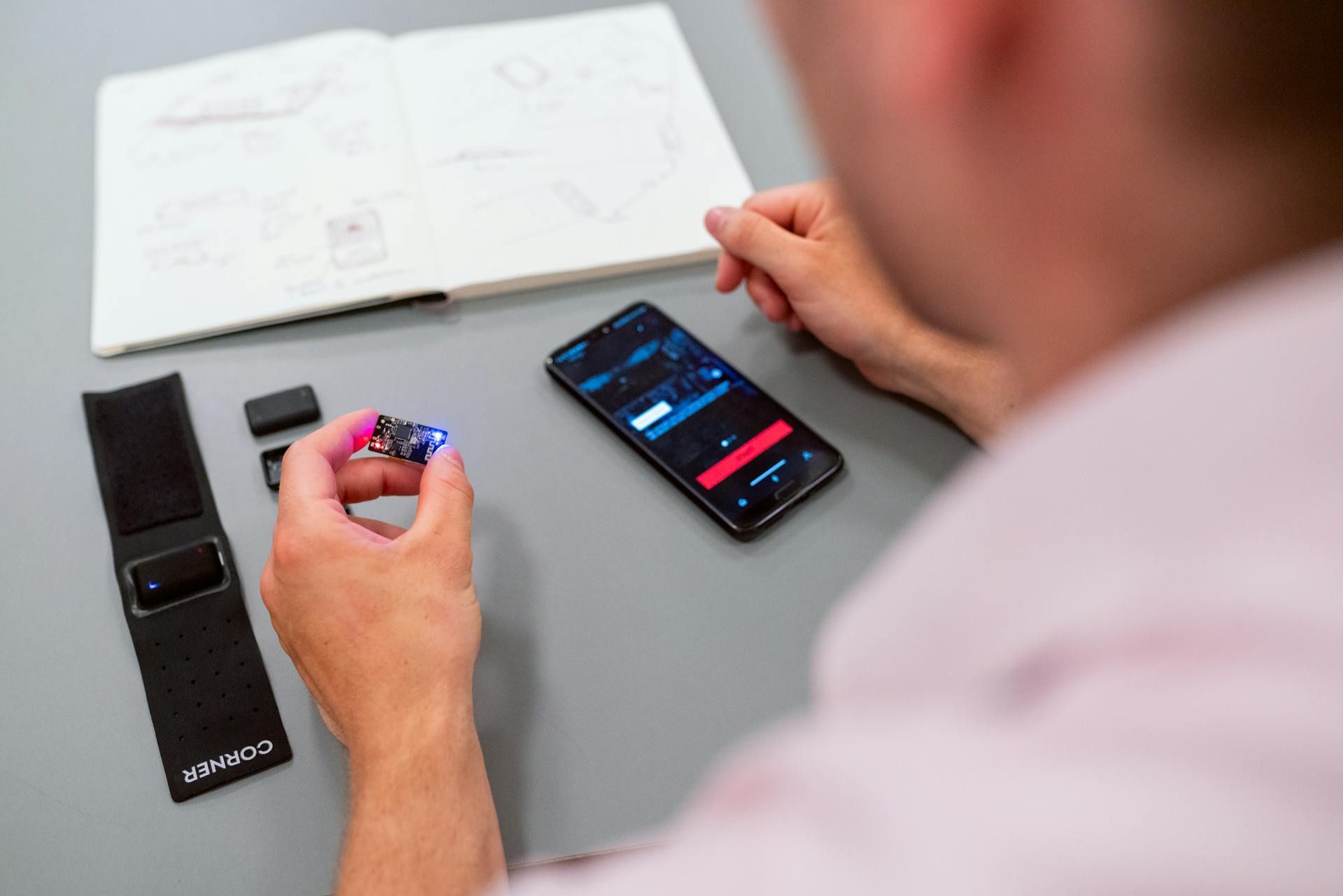
Learning Morse code can be a bit of a challenge, but it's definitely doable with some dedication and practice.
The key to learning Morse code is understanding the basic pattern of dots and dashes that represent different letters and numbers. This pattern is the foundation of Morse code, and it's essential to master it before moving on to more complex concepts.
It's worth noting that Morse code is a relatively simple code to learn, especially when compared to other coding systems. In fact, it's estimated that a beginner can learn the entire Morse code alphabet in just a few hours of practice.
However, as we'll discuss in more detail later, the speed at which you can transmit Morse code messages is a major factor in determining how hard it is to learn.
Getting Started
Learning Morse code can seem daunting, but with the right approach, it's actually relatively easy. To get started, it's essential to learn the individual characters themselves.
Research suggests that learning how to receive Morse code before trying to transmit is a good idea. This will help you develop a strong foundation and improve your chances of success.
To learn the Morse code, you can start by listening to recordings of the letters in alphabetical order. This will help you associate the sound of each letter with its corresponding character. You can also use a computer program to learn Morse code, which can be a great way to make the process more engaging and efficient.
One tip for learning Morse code is to start with a small number of characters each day and review them regularly. This will help prevent feeling overwhelmed and make the learning process more manageable.
It's also worth noting that persistence and regular practice are key to learning Morse code. A little practice each day is better than a large amount of practice once a week.
Learning Techniques
Learning Morse code can be a bit of a challenge, but with the right techniques, you'll be sending and receiving messages in no time.
Persistence is key when it comes to learning Morse code, so make sure to practice regularly, even if it's just for a few minutes each day.
You can learn Morse code in many different ways, and some people find that using mnemonic devices and word associations helps them remember the code more easily. For example, you can associate the letter "C" with the word "catastrophic".
To get started, it's a good idea to learn the basic signals of Morse code, which include dots and dashes. You can practice saying these signals out loud to get a feel for the rhythm.
Here are some effective Morse code learning methods:
- Utilize Morse code training apps
- Invest in audio learning courses
- Attend Morse code classes
- Practice with friends or in a group
- Listen to Morse code recordings
You can also try using word associations to help you remember the Morse code alphabet. For example, you can link the letter "E" to the word "easy" because it's only one character.
Learning the Morse code alphabet is key to talking in Morse code, and practicing the alphabet regularly can help you commit it to memory. You can start by learning the easy letters like "E" and "T", and then move on to harder ones.
Knowing the number of characters in each letter can also help you narrow down your possibilities when you receive a message. For example, the letters "T" and "E" both have only one character.
Some letters are also the reverse of each other in Morse code, which can be helpful to remember. For example, the letter "a" is represented by the code "._", while the letter "n" is represented by the code "_.".
Related reading: Books to Help Learn Code in Java
Practicing
Practicing Morse code is a crucial step in learning the system. It's relatively easy to learn, but it does require regular practice.
Listen to Morse code recordings to get a sense of how communication is carried out using the system. Pay attention to the pauses between each character as well as the characters themselves. You can also slow down the playback of the recording to make each signal easier to pick out.
Copy children's books to practice Morse code as a beginner. Children's storybooks are full of terse, simple language that are perfect for practicing Morse code.
Write to yourself in Morse code to reinforce your knowledge. You can copy out a few important words and phrases, then jumble them up and translate them at the beginning of the next session.
Get help from a friend to improve your skills together. You can use code to greet one another, communicate ideas, or tell dirty jokes in secret. This makes learning more fun and helps you stay motivated.
Here are some additional tips for practicing Morse code:
- Use a Morse code training app, such as AA9PW, to practice for 10 minutes a day.
- Listen to pre-recorded Morse code transmissions to learn its rhythm.
- Practice with a friend or in a group to make learning more enjoyable and to get feedback on your progress.
- Listen to Morse code recordings to improve your skills.
Regular practice is key to improving your speed and accuracy. Try to practice for at least half an hour a day, and preferably every day. This will help you get away from thinking "dit-dah" and start recognizing the characters by sound.
Suggestion: Learn Your Name in Morse Code Day
Tips and Strategies
Learning Morse code can be a challenging task, but with the right approach, you can master it in no time. The key is to start with the basics, such as understanding the dot and dash signals.
To commit the Morse code alphabet to memory, try using mnemonic devices. This can help you associate each character with a word or phrase, making it easier to recall.
Practicing the proper rhythm and timing is crucial when learning Morse code. This will help you develop muscle memory and improve your overall speed and accuracy.
You should avoid mentally counting the dits and dahs, as this can hinder your progress. Instead, focus on recognizing characters by sound.
Don't get discouraged if you find it frustrating at times – Morse code can be surprisingly easy to learn at others. The key is to stay consistent and keep practicing.
To get the most out of your practice, try to engage in collaborative learning with others. This can be a great way to stay motivated and learn from others.
Here are some tips to keep in mind as you learn Morse code:
- Understand the basic dot and dash signals
- Commit the Morse code alphabet to memory
- Practice the proper rhythm and timing
- Utilize mnemonic devices
- Engage in collaborative learning
Remember, the goal is to recognize characters by sound, not by counting. With consistent practice and the right approach, you'll be sending Morse code like a pro in no time!
Understanding Basics
Morse code is a series of dots and dashes that represent letters and numbers, making it a unique and memorable way to communicate.
The International Morse Code, which is the most widely used, was created in the 1830s by Samuel Finley Breese Morse and his colleagues. It uses a specific pattern of dots and dashes to represent each letter and number.
Each letter and number in Morse code has a distinct sequence of dots and dashes, with some letters sharing the same sequence. For example, the letter "S" is represented by three dots, while the letter "O" is represented by three dashes.
There are 26 letters and 10 numbers in the International Morse Code, making it a relatively simple code to learn. However, mastering the code requires practice to become proficient in deciphering and encoding messages.
The speed at which you can learn Morse code depends on your dedication and practice. Some people can learn the code in a few days, while others may take weeks or even months to become proficient.
Transmitting
Transmitting is a crucial step in mastering Morse code. You'll want to get on the air with your skills, but there are some things to consider before you start.
To transmit, you'll need a device called a key, which is used to send Morse code. There are many types of keys available, but most people suggest starting with an iambic (dual-lever) paddle system. These are the easiest and fastest devices commonly available.
A Bencher brand iambic paddle, such as the BY-1, is a popular choice among experienced CW hams. You can often find them used at a reasonable price, or new for around $125.
You may also need an electronic keyer, which is a dedicated knob that allows you to adjust transmission speed. Many modern HF rigs have this feature built-in, but it's nice to have a separate keyer for more control.
Learning how to transmit takes a bit of skill, but there are resources available to help you. K7QO's guide is a great resource for learning how to transmit, and you can also find information on slow-speed nets and making a QSO online.
Here are some key options to consider:
- Bencher brand iambic paddle (BY-1): a popular choice among experienced CW hams
- iambic (dual-lever) paddle system: the easiest and fastest devices commonly available
- Electronic keyer: a dedicated knob that allows you to adjust transmission speed
Frequently Asked Questions
How long does it take to learn Morse code?
Learning Morse code requires a daily commitment of 15-30 minutes, and the time it takes to reach your goal varies from a month to several months depending on individual progress. With consistent practice, you can achieve your Morse code goals.
Can I teach myself Morse code?
Yes, you can teach yourself Morse code with consistent practice, ideally 10 minutes a day, and listening to code tapes or computer practice code. Regular practice will help you learn and master the code quickly and efficiently.
Can I learn Morse code in a day?
Learning Morse code in a day is unlikely, as it typically takes a month or two to reach a speed of 10 wpm with consistent practice. With regular practice, you can develop the skills to recognize whole words, but it requires a significant amount of time and dedication.
Featured Images: pexels.com


